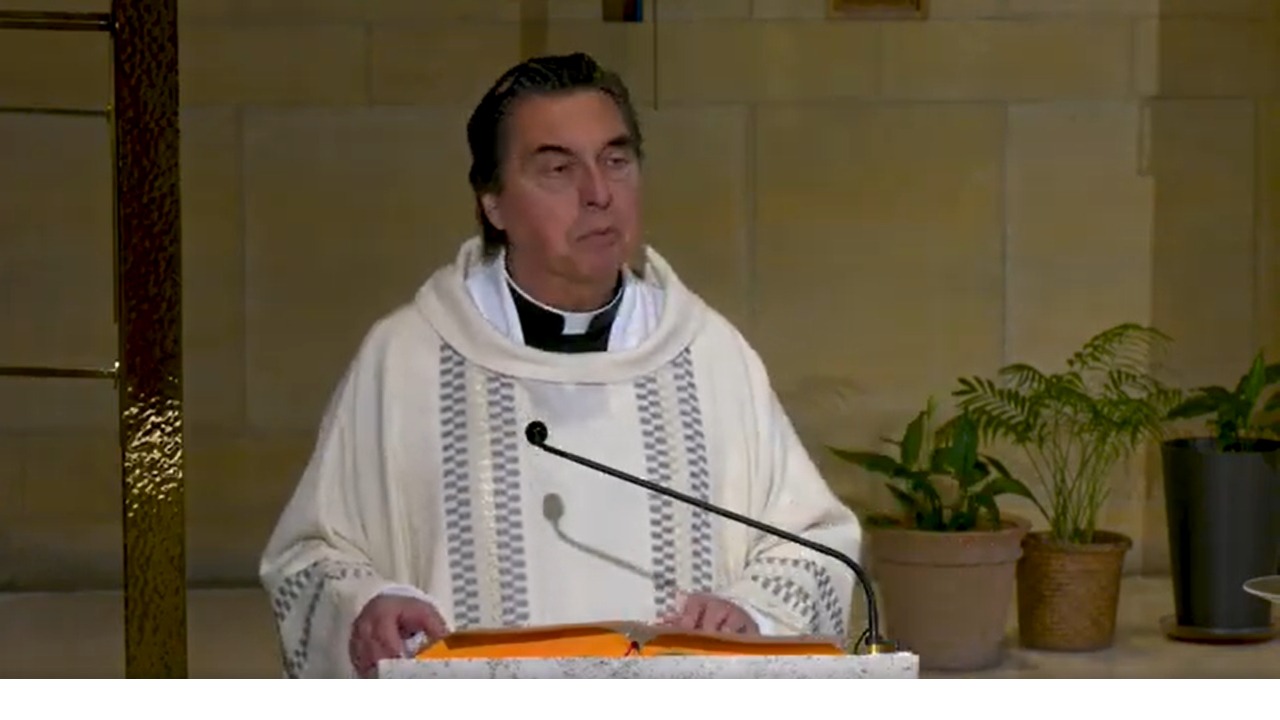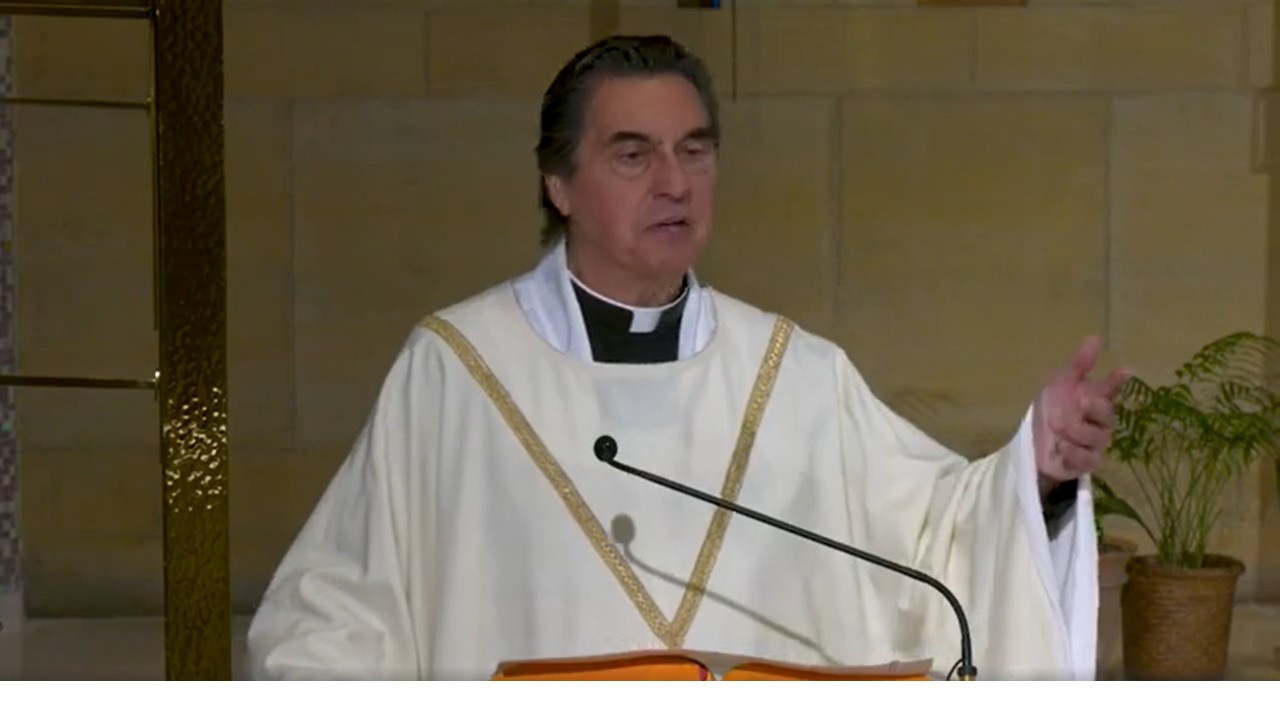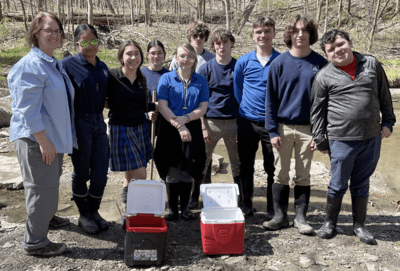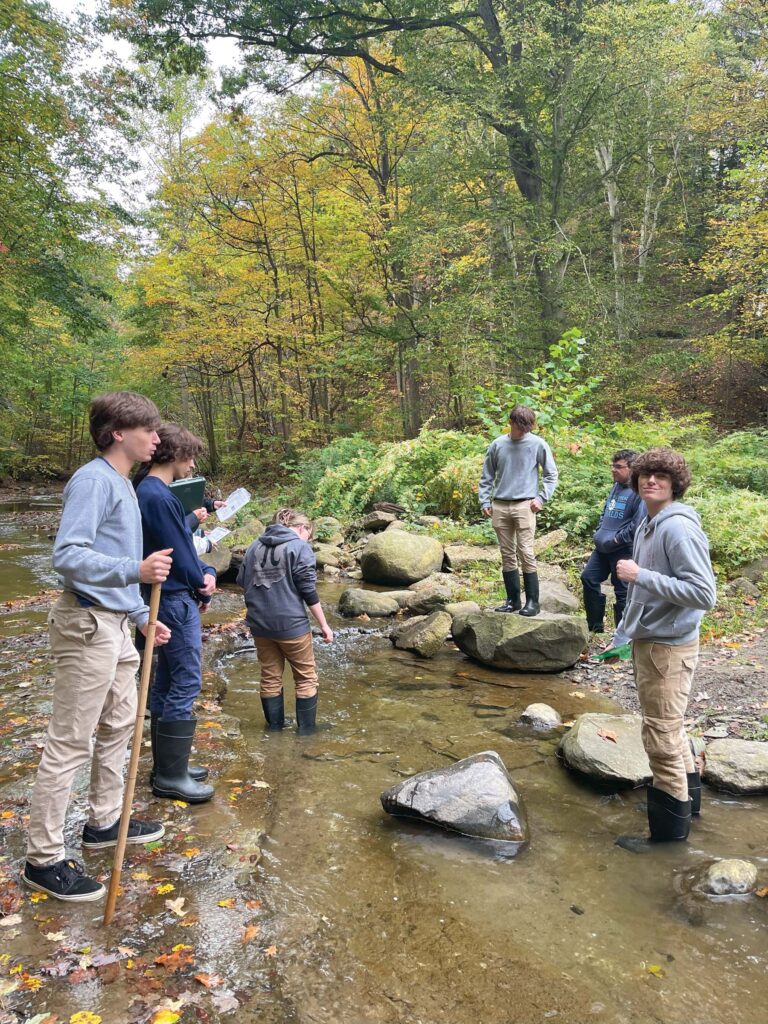
Whether in the classroom, the parish or school garden, or in the public square, Catholics in the various counties of the Youngstown Diocese are engaged in efforts to put Pope Francis’ Laudate Deum—on care for our environment or our “common home”—into practice.
“It starts with us,” said R.J. Mangan, director of peace and justice for diocesan Catholic Charities, who recently spoke at Little Flower Parish, Canton, on Laudate Deum, Pope Francis’ 2023 apostolic exhortation. The exhortation calls Catholics to a renewed vigor in addressing global climate change.
Laudate Deum is a follow-up to Pope Francis’ 2015 encyclical, Laudato Si, which Pope Francis wrote “to share with all of you, my brothers and sisters of our suffering planet, my heartfelt concerns about the care of our common home.”
“With the passage of time, I have realized that our responses have not been adequate,” Pope Francis explains in Laudate Deum, and focuses more specifically on how to address environmental concerns.
Mangan explained Pope Francis’ major themes, including the seriousness of the problem, the need for effective policies and the setting of goals with meaningful timelines, and awareness “that there are consequences to not reaching them.”
Yet, while emphasizing the need for comprehensive policies on the regional, national and international levels, Mangan explained that Pope Francis also seeks to engage people at the individual, “grassroots” level.
“He’s calling on us to rethink” popular understanding of human actions toward the environment and climate change, Mangan explained. “We have to start the conversation at the local level. There are no cultural changes without personal changes.”
Mangan did note that he is encouraged by the interest he has witnessed in Catholics across the diocese who are already addressing these issues, but he emphasized that they are just the beginning. For example, many of our parishes and schools have become involved in environmental education, advocacy and stewardship.
ENVIRONMENTAL EDUCATION
One example of efforts to engage Catholics in care for the environment is the environmental science class at Saint John School in Ashtabula, in which high school teacher Lesley Baker works to engage her students both inside and outside the classroom walls (See related story on www.CatholicEcho.org).
One such effort involves raising rainbow trout in classroom tanks in order to stock Hubbard Run, a tributary of the Ashtabula River. In addition to enhancing their knowledge of local fish life, Baker said, “the students are learning about sustainability.” As part of the project, students also receive training through the Ohio Department of Natural Resources in monitoring water quality to help ensure that the trout will find suitable waters to begin their new lives.
“Now they are a part of promoting conservation,” Baker said.
Students who are not in Baker’s class can still become involved in the school’s other environmental initiatives through the environmental club, which engages the entire student body. Baker, along with Linda Holler, fourth-grade science teacher at Saint John, and Anna Thomas-Smith, who teaches pre-K, lead the environmental club, which is working on a pollinator garden and is planning a slate of activities for a week-long celebration of Earth Day this month.
Baker also finds opportunities to present to her environmental science students the societal aspects of environmental issues, including discussion of Pope Francis’ Laudato Si and Laudate Deum.
“You don’t have to separate the scientific understanding of the environment with the moral consideration of the care of our natural resources—to conserve, to foster sustainability so that we can have it for the next generation,” Baker noted.
Other diocesan schools have worked to raise awareness of environmental issues. Kristie Cramer, with Stark County Catholic Schools, noted that Canton Central Catholic High School is including Pope Francis’ teachings on the environment in its senior religion classes.
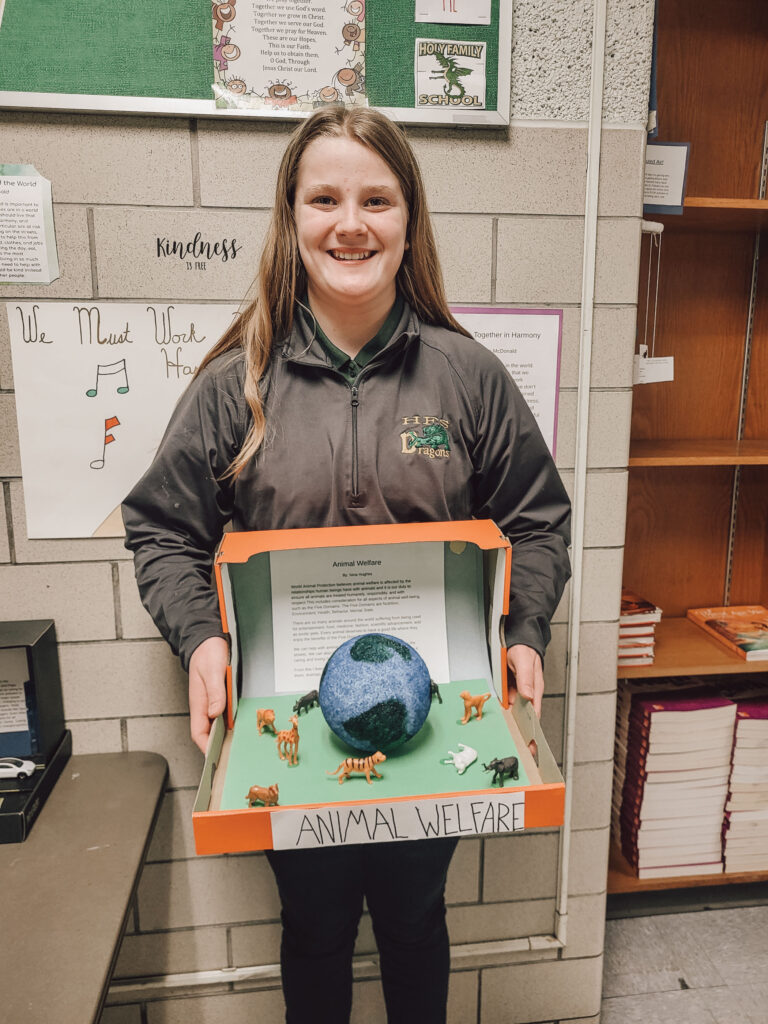
At Holy Family School in Poland, fifth- and sixth-grade students participated in a Laudato Si project, Marilyn Hammerton, a religion teacher, explained. After watching a video on Laudato Si, students were assigned to research and come up with a paper and a collage, poster, mobile or diorama on the theme of “How can you protect the world?”
Most of the students focused on the environment, researching and writing on littering or recycling, Hammerton said. One student, whose family had purchased an electric car, researched the pros and cons of electric vehicles.
“I think our students have become much better informed,” Hammerton said.
ENVIRONMENTAL ADVOCACY
Other parishes and schools have involved themselves in the public sphere.
Members of St. John the Evangelist Parish in Summitville—one of the Columbiana County “Crossroads” parishes along with St. Philip Neri Parish in Dungannon, St. George Parish in Lisbon and St. Agatha Mission in West Point—and the diocesan Office of Rural Life and Ministry have come out in opposition to the proposed Kensington solar power complex, which would be constructed near St. John Parish. The Summitville parish, which was established in 1839, is one of the oldest parishes in the diocese. (See related story at www.CatholicEcho.org).
Father Kevin Peters, diocesan director of the diocesan Office of Rural Life and Ministry, wrote a letter to the Ohio Power Siting Board voicing the concern of parishioners and other residents in the area that the proposed solar power complex will encroach on the many farm families who have cultivated the lands for hundreds of years and negatively impact soil and water quality in the area.
Diane Brown, a parishioner at St. John the Evangelist Parish, where she is a youth minister, lector, finance council member and cemetery committee member, and also a farmer and leader in the community organization Franklin Against Kensington Solar, said that parishioners and the community see the proposed project as disruptive to the life and worship of the relatively young, growing parish community. She noted that the project may also negatively affect the families who visit the nearby parish cemetery.
“This is a large, 2,264-acre industrial-sized solar project that is proposed to surround our church and cemetery on three sides,” Brown said. “This project will also surround the villages of Summitville and Millport in Franklin Township.
“The vast majority of our parishioners have signed a petition opposing it,” Brown said, and Father Stephen Wassie, pastor of St. John the Evangelist, St. George, St. Philp Neri and St. Agatha parishes, has written a letter to the Ohio Power Siting Board expressing opposition as well.
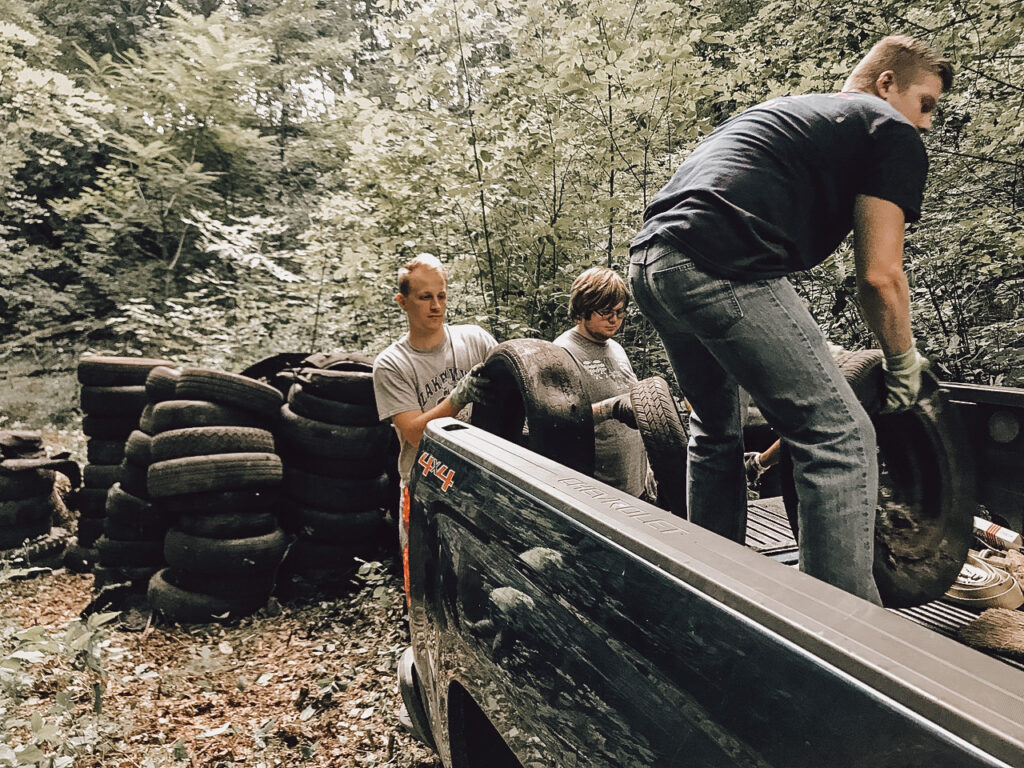
Another parish effort in the public sphere takes place not in a rural area but in inner city Youngstown, where parishioners of St. Angela Merici Parish have been involved for nearly a decade in cleaning up Lincoln Park on the East Side of Youngstown, which borders parish grounds.
Diana Hancharenko, director of young adult ministry for eight years at St. Angela Merici Parish, noted that their young adult group—in conjunction with the larger parish and the broader Youngstown community—has been highly involved in the cleanup.
The park had been the site of dumping of garbage, construction waste and abandoned tires—particularly in the ravine, Little Dry Run Creek, and a section of Lincoln Park Drive that had been blocked off from vehicular traffic.
The years of effort conducted in the warmer months have cleared the refuse, and now the group is giving attention to the park’s nature trails in order to increase their accessibility, remove potential hazards and foster their natural aesthetic appeal, Hancharenko said.
Their work is continuing, she said, citing help from grants—notably $20,000 from Lowe’s and smaller grants from Catholic Climate Covenant and the Wean Foundation—which has made placement of benches, lighting, fencing and waste receptacles possible.
In addition to the intrinsic value of the clean-up efforts, Hancharenko points out, projects like these appeal to young people who have an interest in the environment and provide opportunities for the Church to engage in them.
Mario Ricciardi, one of the young adults active in the cleanup, said, “The experience has been rewarding. It’s important to me that we see the parts of Youngstown that were largely left abandoned or forgotten get some attention. And largely in part, I think that speaks to the Christian mission of being a steward of what has been given to us.”
Hancharenko sees this as a continuing effort. “This is an extension of our parish community, a real manifestation of being the Eucharist in the world,” she said.
ENVIRONMENTAL STEWARDSHIP
Another option that parishes and schools are pursuing to help care for our “common home” is the planting of gardens—to literally cultivate resources in their own spaces that they may share with others.

For example, John F. Kennedy (JFK) Catholic School in Warren, through its Student Betterment Committee, has raised over $15,000 in grants and donations toward its courtyard garden project, noted Jillian Phillips, JFK’s director of communications.
“Beginning last spring, the students built raised garden beds, and planted and maintained a garden over the summer. When we returned to school, the harvest was used in our dining hall,” Phillips said. They also shared their harvest with the St. Vincent de Paul Society for their meals for those in need.
In response to Pope Francis’ Laudato Si, St. Rose Parish in Girard has also initiated a garden program, where the school children plant and care for vegetables and flowers.
In Ashtabula County, St. Joseph Calasanctius Parish in Jefferson has set up rain barrels to help conserve water for the vegetable garden that Father John Ettinger, pastor, maintains, noted Lori Gilhousen, who chairs the parish council.
Recycling also seems to be a popular pursuit for Catholic institutions in the six counties.
St. Michael the Archangel Parish in Canton “does its best to keep awareness of the need to care for the earth high and provides ways for the entire community to put this care into practice,” said Humility of Mary Sister Carolyn Capuano, pastoral associate for liturgical and social justice ministry—including recycling.
“I think it started about 10 years ago—before I got here—and it has expanded to where it is now,” Sister Carolyn commented, commending the pastors who have served there and the parishioners for their support. “They see it as a ministry—and one that anyone can engage in.”
“In 2023, the parish paper and recycling program saved well over 390 tons from landfills,” Sister Carolyn said. In partnership with Integrity Fiber and working with various local businesses, the parish has 13 paper and cardboard recycling bins on parish grounds. “The bins often fill up and are emptied several times a week” because parishioners are aware of the need and the opportunity. “Area businesses also join with St. Michael’s and have bins on their properties for recycling.”
“In addition to caring for earth, this effort also nets the parish funds that are used for its emergency assistance program,” Sister Carolyn noted.
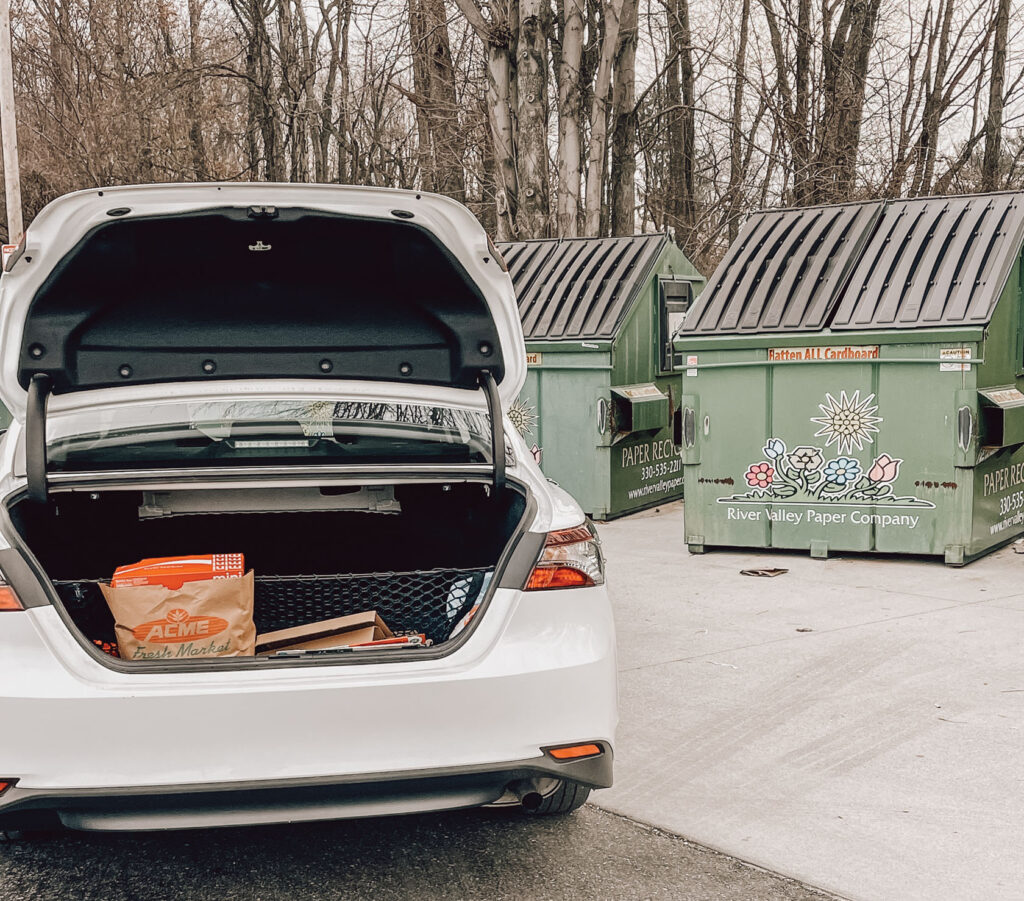
St. Michael also collaborates with the Stark-Tuscarawas-Wayne Recycling District for collecting metal, plastic and glass—from parish staff, parishioners and other community members. The parish also has water bottle filling stations as an alternative to the use of disposable water bottles.
“Music ministry at St. Michael’s is also ecologically aware,” Sister Carolyn said, noting that for a number of years, the parish has employed large LED screens in lieu of parish hymnals or paper worship aids. These screens feature large, strategically placed digital displays for music lyrics as well as instructions for congregational standing and kneeling. “This practice has reduced paper use, printing costs, and has helped to keep the worship space clutter-free.”
Throughout it all, Sister Carolyn noted, “We’ve been continuing to communicate with the parishioners and keep it going strong. Frequently, we pray for the environment, wise use of resources, and so forth.”
At Canton Central Catholic High School, “we have an ongoing recycling program here that students and staff participate in,” Cramer noted. “Our end-of-year recycling includes a collection of reusable school supplies which we donate to Hartford Middle School.”
ENVIRONMENTAL CARE AT HOME
Beyond the realm of Catholic institutions, Mangan said there are various ways Catholic families can foster understanding and practice of Laudate.
“Celebrating the many saints that have a connection with the environment is one way. Or, your family can practice carbon counting,” he said. “Figure out your carbon footprint and take steps to reduce it. There are simple steps with low-cost solutions.” The Environmental Protection Agency offers a free Carbon Footprint Calculator on its website.
Mangan also urges Catholic families “to try to use non-disposable goods over disposables. Or not consuming more than you need to. Or making a home garden and getting connected in a very real way to the environment.” Walking, hiking, camping and spending time in nature is another way that Catholic families can connect with the environment together.
“Meanwhile, the Diocese of Youngstown is at this present time coming out with a plan to act on Laudate,” Mangan said. Though he can’t say exactly when the plan will be announced, “I’m hoping sooner rather than later.”









